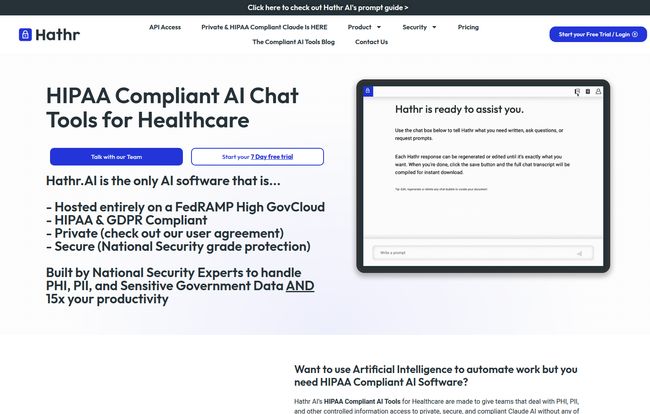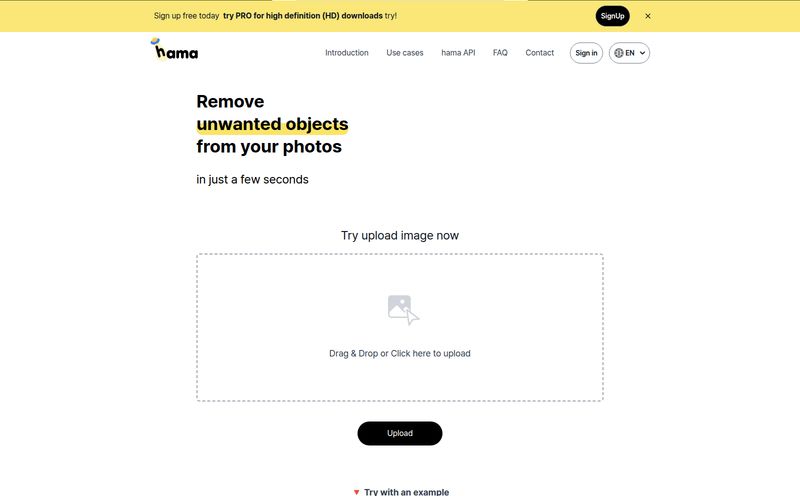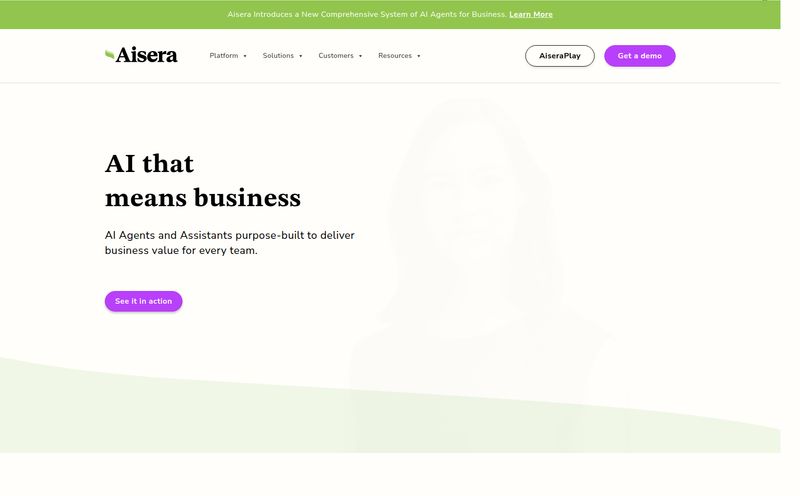The AI boom has been, well, a boom. It's exciting, it’s chaotic, and it’s changing how we all work. But if you're in an industry like healthcare, finance, or government contracting, that excitement probably comes with a healthy dose of sheer terror. The thought of a team member pasting sensitive client data or Protected Health Information (PHI) into a public AI tool is the stuff of nightmares. It’s a one-way ticket to a compliance disaster and a visit from some very unhappy auditors.
For years, we've been in a standoff. On one side, we have these incredible AI tools that promise to 10x our productivity. On the other, we have the iron walls of HIPAA, NIST, and other regulations. For a while, it seemed like you couldn't have both. You either innovated fast or you stayed safe. You couldn’t do both.
That's the promise of platforms like Hathr AI. They waltz in and claim to have built the bridge over this chasm of compliance. But as a guy who’s seen a lot of tech promises fizzle out, I’m always skeptical. So, I decided to take a closer look. Is Hathr AI the real deal, or just more marketing fluff?
First Off, Why Is AI and HIPAA Such a Minefield?
Before we get into Hathr, let’s quickly set the stage. Most standard AI models—the ones we all know and have played with—are like public commons. When you feed them data, you don't really know where it goes. Is it used for training? Is it stored on a server in a country with different data laws? Can the AI company’s employees see it? For most of us, this is fine. For a hospital administrator, it's a non-starter.
The HIPAA Security Rule requires very specific safeguards to protect electronic PHI. We're talking strict access controls, audit trails, and data encryption. Your average AI chat tool was not built with this in mind. It was built to write poems and plan vacations, not to handle patient records securely. Using it for regulated data is like performing surgery with a spork. You just... dont.
So, What is Hathr AI, Really?
Hathr AI positions itself as the grown-up in the room. It’s an AI platform specifically built for the paranoia of regulated industries. Think of it less like a public AI playground and more like a secure, private AI laboratory. It offers a suite of tools, including a chat interface and an API for developers, but with one massive difference: it’s all wrapped in layers of security and compliance certifications.
It’s built from the ground up to be HIPAA and NIST 800-171 compliant. And they don't just say that; they back it up by hosting everything in AWS GovCloud. For those not in the know, GovCloud is Amazon's cordoned-off section of the cloud built for the U.S. government. It's a digital Fort Knox, with requirements like having only U.S. citizens manage the infrastructure and keeping all data firmly within U.S. borders. This isn’t just a feature; it's the foundation of their entire trust proposition.

Visit Hathr AI
The Core Pillars of Hathr AI
When you peel back the layers, Hathr's value comes down to a few key things that should make the person in your company’s legal department sleep a little better at night.
Uncompromising Compliance and Security
This is their headline act. They're not just 'HIPAA-friendly'; they provide a Business Associate Agreement (BAA), which is a legal necessity for any vendor handling PHI. They are also NIST 800-171 certified, which is a big deal for anyone working with the Department of Defense or other federal agencies. This isn't just a checkbox; it’s a commitment to a rigorous, ongoing security posture. Your data is also segmented from every other customer, so there’s no cross-contamination. It's your own private AI instance, essentially.
A Focus on Real-World Productivity
Okay, let's talk about that big 10-35x productivity increase claim. I'll be honest, I roll my eyes at numbers like that. But even if we temper our expectations, the potential is undeniable. Imagine being able to summarize lengthy patient histories, draft pre-authorization requests, or analyze administrative reports in seconds instead of hours. The platform uses privacy-focused models like Claude AI, so you’re getting cutting-edge language capabilities without the data privacy risks. Even a 2x or 3x productivity boost on these tasks is a massive win, and from what I see, that’s more than achievable.
Flexible Tools for Everyone
Hathr isn't a one-size-fits-all solution. They've got a few different offerings:
- The HIPAA Compliant AI Tool: This is for the end-user. The doctor, the paralegal, the administrator. It's a simple chat interface where you can safely work with sensitive data.
- The HIPAA Compliant API: This is for the tech teams. It lets developers build Hathr's secure AI capabilities directly into their own custom applications, workflows, and healthcare software. This is huge for organizations that want to innovate without reinventing the compliance wheel.
- Enterprise Solutions: For larger organizations that need it all—multiple seats, single sign-on (SSO), custom models, and specialized support.
Breaking Down the Cost: Hathr AI Pricing
Alright, the all-important question: what's this going to cost? I was pleasantly surprised to see they are transparent with their entry-level pricing, which is a good sign. So many B2B tech companies hide their prices behind a “Contact Us” wall of doom.
| Plan | Price | Best For |
|---|---|---|
| Single Subscription | $45 / month | Individual professionals or small teams needing a secure AI chat tool. |
| HIPAA Compliant API | Custom Pricing | Development teams wanting to integrate compliant AI into their own products. |
| Enterprise | Contact for Quote | Large organizations needing multiple seats, SSO, and custom deployments. |
My take? $45 a month for the Single Subscription is honestly a bargain. Think about the cost of a single data breach, both in fines and in reputational damage. It's astronomical. Paying less than fifty bucks a month for a tool that dramatically reduces that risk while also saving you time seems like a no-brainer. It's an insurance policy that also does your work for you.
Who Should Be Using Hathr AI?
This part is simple. If your job title involves words like "healthcare," "clinical," "legal," "government," or "financial compliance," you should be paying attention. This tool is purpose-built for you.
It's for the small medical practice trying to streamline billing, the large hospital system looking to automate administrative tasks, the government contractor handling sensitive project data, or the law firm managing confidential client information. It's for anyone who has looked at the power of AI and thought, "I wish I could use that, but I can't risk it."
Who should pass? If your business is selling t-shirts online or writing a food blog, you don't need this. The public AI tools will work just fine for you. Hathr AI is specialized equipment for a specialized job.
My Unfiltered Pros and Cons
No tool is perfect, right? After digging in, here's my honest breakdown.
The Good Stuff: The biggest pro is the peace of mind. Knowing your data is secured in AWS GovCloud and handled with HIPAA and NIST compliance is huge. The all-American approach—US-based data, US-based employees—is another massive trust signal for their target market. The clear, accessible pricing for the single user plan is refreshing, and the availability of an API shows they are serious about being a platform, not just a single product.
The Potential Downsides: Any powerful tool has a learning curve, and I suspect that to get that full 35x productivity boost, you'll need to invest some time in learning how to craft effective prompts and workflows. Also, the price, while I feel it's fair, is obviously higher than a free or $20/mo public AI tool. But you're not just paying for the AI; you're paying for the entire security and compliance infrastructure. It's a classic case of you get what you pay for.
Frequently Asked Questions About Compliant AI
Is a tool like Claude AI or ChatGPT HIPAA compliant on its own?
No. Absolutely not. The standard, public versions of these tools are not designed for PHI and do not come with a BAA. You can only use them in a compliant manner through a secure platform like Hathr AI that has built the necessary safeguards around the technology.
What is a Business Associate Agreement (BAA) and why does it matter?
A BAA is a legal contract required under HIPAA between a healthcare provider (covered entity) and a vendor (business associate) that will handle PHI. It ensures the vendor will protect the data according to HIPAA rules. Without a BAA, you are not compliant. Hathr provides one.
Can I really just upload confidential documents?
To a standard AI? Please don't. To a platform like Hathr AI? Yes, that's what it's built for. Its entire architecture is designed to create a secure environment for you to work with that exact kind of data.
What makes an AI a 'HIPAA Compliant Large Language Model'?
It’s less about the model itself and more about the environment it operates in. The magic is in the platform. A compliant solution involves a combination of the AI model, secure infrastructure (like AWS GovCloud), strict access controls, data encryption, audit logging, and the willingness to sign a BAA. Hathr brings all these pieces together.
The Final Verdict: Is Hathr AI Worth It?
After looking at everything, my initial skepticism has turned into genuine optimism. Hathr AI isn't just another AI tool. It's a solution to a very real, very expensive problem for a huge number of professionals.
They’ve tackled the boring, difficult, and absolutely critical part of the equation: compliance. By doing so, they've opened the door for regulated industries to finally start using the power of AI without constantly looking over their shoulder. For any organization that values its data and its reputation, the investment seems not just reasonable, but necessary.
If you've been on the AI sidelines out of fear, Hathr AI looks like a pretty safe and powerful way to finally get in the game.



